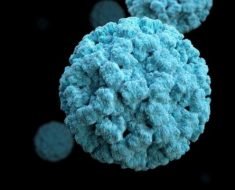Recently a friend who is combining a job she loves with a PhD and raising small children told me, "I just feel so stressed all this time, I hate to think what this is doing to my health."
Although my friend doesn't have a formal mental health disorder, she is concerned because of growing awareness about the relationship between physical and mental health.
The medical link between inflammation in the body and depression is gaining momentum.Credit:The Age
One of the important mediators of this is the immune system, even when it comes to a disease as seemingly cerebral as depression.
We all have days when we feel sad or down but depression goes beyond this: it is a persistent low mood with a loss of enjoyment in life that occurs daily, for at least two weeks.
People with depression describe feeling flat, irritable, overwhelmed or frustrated and often get stuck, unable to move away from negative thoughts. This is often accompanied by physical symptoms, including lethargy, slowed movements, changes in appetite, headache and muscle pains.
Tiredness is a common physical symptom of people suffering depression.Credit:Shutterstock
One of the leading causes of disability
Depression is an important risk factor for the development of physical health problems. Studies have shown that individuals with depression have a 1.6-times higher risk of developing heart disease than the general population.
For years, doctors and researchers thought this was because people who are depressed don’t have the energy or motivation to take positive lifestyle steps, such as quitting smoking. But more recently depression has become associated with changes in our immune systems that might affect our physical health.
Inflammation is the body’s call to arms when there is a threat. When a virus enters our body, it is detected by our white blood cells, which then release chemical messengers called cytokines to put our immune system on high alert.
Chronic stress seems to increase our immune activation. Over a long time, this is associated with an increased risk of physical disease. This relationship between physical and mental health goes both ways. Just as our thoughts and mood can impact our physical health, our physical needs also directly influence our feelings and behaviours. When our stomachs are empty, we experience hunger and find food, when it is hot in the sun we seek shade, when it is dark we are more likely to feel sleepy.
Similarly, when we are sick with the flu, we feel tired, we can’t concentrate, we avoid company, our muscles ache and often appetite is reduced: a similar set of symptoms to depression.
When our body is threatened with an infection, we have measurably higher levels of inflammation. Similarly, slight increases in these same markers of inflammation are associated with an increased risk of developing depression.
Drug trials in early stages
Trials of anti-infammatory medications being used to treat depression are still underway but there are lifestyle steps that can improve mood, such as exercise, which can decrease the risk of getting depression and even improve symptoms for those who have it, with as little as two sessions a week.
Charles Raison, a professor at the University of Wisconsin-Madison, says that exercise can provide a transient "hit" to the immune system that triggers other regulatory cytokines to dampen down the response, which may be one of the reasons exercise is such a powerful tool for improved health.
Deakin University professor Felice Jacka, who has written an upcoming book, Brain Changer, has led research that found people who eat a diet high in whole foods such as fruits, vegetables, nuts, wholegrains, legumes, fish and unsaturated fats (such as olive oil) are up to 35 per cent less likely to develop depression, while a diet high in sugary and processed foods increases the risk of depression.
Professor Jacka believes that a possible mechanism for this is that highly processed foods make the gut "leaky", leading to chronic activation of the immune system.
But it's still complex …
Not everyone with inflammation will develop depression, and not everyone with depression will have raised levels of inflammation. Like most human diseases, the development of depression is a complex interplay between genetics, psychological supports and our environment.
Medications absoloutely have a role in treating depression, and I would never want anyone reading this to stop their prescribed antidepressants unless it was part of a treatment plan made with their doctor.
At the same time it is incredibly empowering that we have choices within our own power that can have a positive impact on mood and wellbeing, both for short-term and long-term health.
Dr Kate Gregorevic is a specialist at the Royal Melbourne Hospital.
Source: Read Full Article







